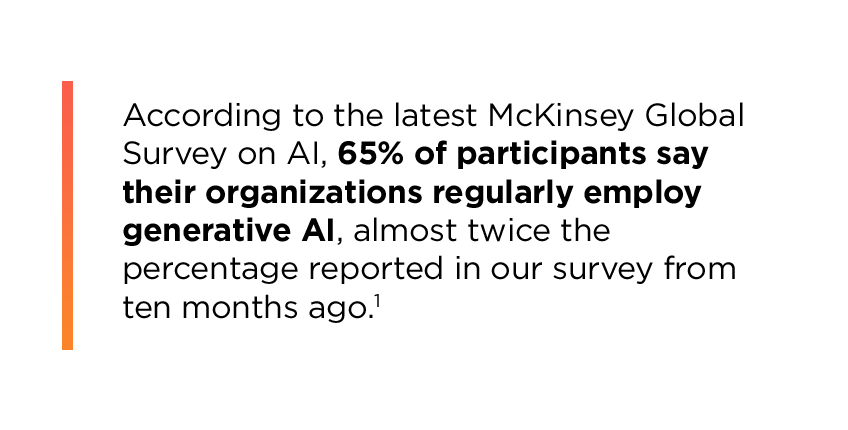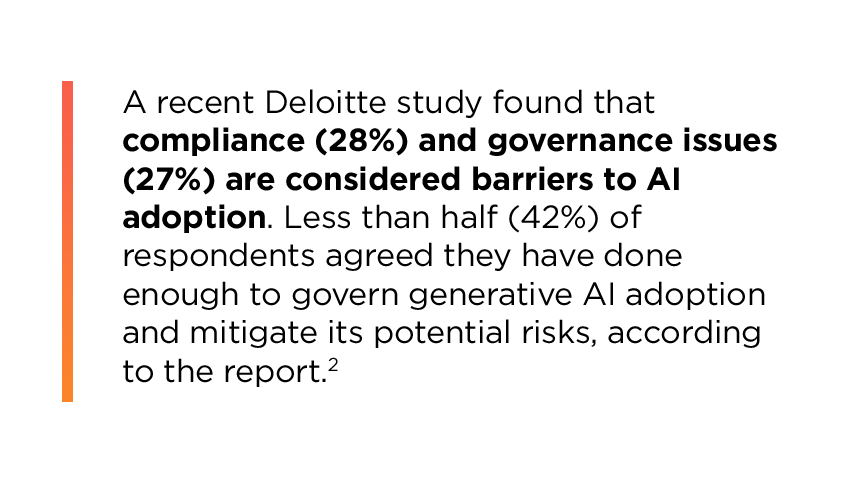Secure Your Future: The Benefits of Ethical AI Governance

Once thought to be heading for disaster, the U.S. stock market has rebounded and reached new record highs. This recovery is fueled by supportive economic policies and strong corporate earnings. The S&P 500 has increased notably, fueled by growth in the tech sector, especially AI-focused companies.
These businesses have accelerated AI advances, boosting investor confidence and market performance. AI integration into business processes has improved efficiency and created new revenue streams, supporting stock market gains.
Large corporations have greatly benefited from AI by leveraging it to streamline operations, enhance decision making and foster innovation. For example, AI-driven analytics and predictive modeling have enabled companies to optimize supply chains, reduce costs and improve product offerings. Additionally, AI-powered customer service solutions, such as chatbots and virtual assistants, may help improve customer engagement and satisfaction. These advancements have allowed large corporations to maintain a competitive edge and achieve higher profitability in a rapidly evolving market.
At the same time, smaller businesses are also benefiting from generative AI, which has made advanced technological tools more accessible. Generative AI, a form of artificial intelligence, can generate new content—like text, images, music or even code—by learning from existing data patterns. Essentially, it generates original outputs based on its training data.
 Applications of generative AI, including automated content creation and personalized marketing, have helped small businesses improve their operational efficiency and customer service. This technological advancement has empowered smaller enterprises to compete more effectively with larger companies, driving innovation and growth across various sectors.
Applications of generative AI, including automated content creation and personalized marketing, have helped small businesses improve their operational efficiency and customer service. This technological advancement has empowered smaller enterprises to compete more effectively with larger companies, driving innovation and growth across various sectors.
Generative AI has revolutionized our workflows in a remarkably short period. However, the advent of this new technology also makes it a prime target for misuse and cyberattacks.
Generative AI requires managing vast amounts of data, which often includes sensitive information. This raises concerns about data breaches or information misuse, potentially leading to significant legal and reputational consequences for businesses. Additionally, generative AI may produce content that unintentionally infringes on existing intellectual property rights, resulting in legal disputes and complications in establishing ownership of AI-generated content.
Misuse of AI has even led to news stories that can damage a company’s reputation. For example, a large tech firm was blindsided when its employees accidentally leaked confidential information using ChatGPT to review internal code and documents. The company instantly banned the use of generative AI tools to prevent future data breaches until use policies were instituted.
A company can follow several steps to manage how employees interact with generative AI for their own safety and that of the organization, including implementing an AI governance policy, employee AI training programs and an internal AI taskforce.
 Implementing an AI Governance Policy
Implementing an AI Governance Policy
A well-structured AI governance policy enables your company to capitalize on the benefits of generative AI while reducing potential risks and encouraging responsible use. Such a policy guides organizations through the ethical, legal, reputational and societal challenges that come with implementing AI systems for content generation. It helps ensure responsible and accountable use of AI technology while safeguarding the interests of users, customers and the broader community.
An AI governance policy helps organizations adhere to legal and regulatory requirements, which are increasingly stringent as AI technologies evolve. By complying with these regulations, companies can avoid potential fines and legal issues, safeguarding their reputation and financial stability.
Security is paramount in the digital age, and an AI governance policy plays a vital role in protecting sensitive data from breaches and misuse. With clear security protocols in place, organizations can mitigate risks associated with data handling and ensure that AI systems are robust against cyberthreats. This not only protects the organization’s assets but also maintains the trust of customers and stakeholders who expect their data to be handled securely.
An effective AI governance policy should encompass essential elements that reflect ethical transparency, define employee responsibilities and establish procedures for handling ethical risks:
- Engaging key stakeholders from IT, legal, HR and other departments in policy creation helps provide a comprehensive and well-rounded policy. This teamwork highlights risks and opportunities from various viewpoints, enabling the creation of a stronger, more inclusive policy.
- Clearly defining AI’s role in the business. Specify its uses, applications and expected benefits to set realistic goals, align with the overall strategy and promote efficient resource allocation.
- Establishing ethical guidelines is essential for upholding fairness, transparency and accountability in the use of AI. Creating these standards helps avoid biases and allows AI systems to function in a way that honors human rights and societal norms.
- Enforcing data privacy and security measures constitutes another crucial action. It’s essential to establish strong protocols to protect sensitive data and adhere to pertinent regulations. This approach not only secures the organization’s information but also fosters trust among customers and stakeholders who rely on secure handling of their data.
Institute employee AI training programs
Educating employees about AI ethics and responsibilities via training programs is crucial for fostering a culture of responsible AI use. Employees need to understand their roles and be equipped with the necessary skills to use AI responsibly. Training programs help in educating staff about the ethical and practical aspects of AI, fostering a culture of continuous learning and improvement.
An effective employee AI training program should encompass several key components, each designed to help ensure that employees can work with AI responsibly and effectively:
- Start with a thorough understanding of AI and its applications. Employees need to learn the basics of machine learning, natural language processing, computer vision and other AI fields to understand how AI can solve real-world problems and improve business processes.
- Ensure training addresses ethical considerations. AI raises ethical issues like privacy, job displacement, and misuse. Training must highlight ethical considerations, teaching employees to identify ethical dilemmas and grasp AI’s societal impacts.
- Account for potential bias in AI systems. Employees should learn to recognize and mitigate bias, understand its consequences and ensure fairness and inclusivity in AI applications.
- Teach optimal data management skills for AI. Training should include best practices for handling sensitive data, covering data collection, storage, processing, privacy laws and anonymization methods.
- Create an ethical framework. Employees need frameworks for ethical decisions involving AI, focusing on transparency, accountability and fairness. This helps them align decisions with organizational values and societal expectations.
By educating employees about AI ethics, organizations can help ensure that their AI initiatives are not only technically sound but also socially responsible. This holistic approach to AI training will ultimately lead to more sustainable and trustworthy AI solutions.
Creating an internal AI taskforce
Forming a strong AI task force or committee within an organization is crucial for addressing the intricacies of AI ethics. Having an effective employee AI task force ensures that AI systems are developed and implemented ethically, fostering a more responsible and reliable AI environment.
Here are some best practices for how a business can build this advisory team:
- Choose passionate employees across multiple functions
A strong AI Ethics Committee is essential for any ethical AI initiative. This group oversees AI projects to ensure they follow ethical standards. It should include diverse members like AI experts, ethicists, legal professionals and representatives from different departments to cover all ethical aspects.
- Conduct regular audits
Routine audits are essential to uphold AI system integrity. Conducting periodic audits helps identify and resolve ethical concerns. Regular reviews ensure responsible technology use and quickly address biases or unintended results.
- Collaborate with external experts
Organizations, particularly in AI ethics, benefit from external insights. Collaborating with academics or ethics consultants helps keep the task force informed on current ethical standards and aligns AI projects with societal values.
- Engage in industry initiatives
Engaging in industry-wide efforts is crucial. By participating in initiatives to develop ethical AI standards and best practices, the task force can both contribute to and gain from shared knowledge and experience. This also shows the organization’s commitment to ethical AI on a broader level.
- Implement diverse development teams
Diversity within AI development teams is essential to minimize bias in AI systems. A diverse team brings a variety of perspectives and experiences, which can help identify and mitigate potential biases in AI algorithms. Ensuring inclusivity in the development process is a proactive step towards creating fair and unbiased AI solutions.
Lumen can help you prepare for ethical AI
As AI continues to transform the business landscape, addressing ethical concerns is not just a moral imperative but also a critical factor in building trust, mitigating risks and ensuring long-term success. By implementing robust AI governance policies, investing in employee training and adopting additional tactics such as establishing ethics committees and conducting regular audits, businesses can navigate the ethical challenges of AI implementation more effectively.
The journey towards ethical AI is ongoing and requires continuous effort and adaptation. However, organizations that prioritize these considerations will be better positioned to harness the full potential of AI while maintaining the trust of their stakeholders and contributing to the responsible advancement of technology in society.
Lumen® Managed and Professional Services can help guide your AI journey. From technology integration to holistic guidance around AI implementation, Lumen experts can help your company navigate these complex considerations and conversations.
Explore how Lumen’s solutions and capabilities can benefit your business today.
1McKinsey, The state of AI in early 2024, 2024.
2Deloitte, Deloitte’s State of Generative AI in the Enterprise, 2024.
This content is provided for informational purposes only and may require additional research and substantiation by the end user. In addition, the information is provided “as is” without any warranty or condition of any kind, either express or implied. Use of this information is at the end user’s own risk. Lumen does not warrant that the information will meet the end user’s requirements or that the implementation or usage of this information will result in the desired outcome of the end user. All third-party company and product or service names referenced in this article are for identification purposes only and do not imply endorsement or affiliation with Lumen. This document represents Lumen products and offerings as of the date of issue. Services not available everywhere. Lumen may change or cancel products and services or substitute similar products and services at its sole discretion without notice. ©2024 Lumen Technologies. All Rights Reserved.




